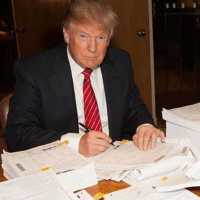California Bill Would Require Release of Tax Returns for Presidential Candidates to Appear on State Ballot
 Donald Trump refuses to disclose tax returns, instead releasing photo of him signing them
Donald Trump refuses to disclose tax returns, instead releasing photo of him signing them
By Nick Cahill, Courthouse News Service
SACRAMENTO, Calif. (CN) – California lawmakers announced a bill Monday that would require any presidential candidate to release at least five years of tax returns in order to be listed on the Golden State’s ballot.
Blasting President-elect Donald Trump’s decision to buck a long-standing trend of candidates releasing their tax returns, two state senators hope the proposal will “help make transparency great again.”
“The American people deserve honesty and transparency from their president. Unfortunately, we are getting lies and obfuscation from President-elect Trump, especially in regards to how his business interests may impact his administration,” newly elected state Sen. Scott Wiener, D-San Francisco, said in a statement.
In both debates and interviews, Trump defended his decision by claiming that he’s under a federal audit and that his attorneys advised him not to participate in the standard presidential practice. Every president since Jimmy Carter has released at least partial tax returns.
Wiener and state Sen. Mike McGuire, D-Healdsburg, modeled their bill after a New York proposal coined the TRUMP Act. The Empire State’s Tax Returns Uniformly Made Public Act – S8217 – requires presidential candidates to release five years of tax returns no less than 50 days prior to the general election, or be left off the statewide ballot.
The California version also requires vice-presidential candidates to release their returns to voters in order to be listed on the ballot of the most-populous state.
“Transparency is a non-partisan issue,” McGuire said. “The world is a dangerous place and all potential conflicts of interest a future president may have, let alone dangerous ties a candidate may have with a foreign government, must be disclosed. This legislation will help make transparency great again.”
While it has become common for presidential candidates to release personal tax returns, Congressional and state candidates often skirt requests, including current California Gov. Jerry Brown.
Brown didn’t disclose his returns during a bitter 2010 campaign against Republican candidate and former eBay CEO Meg Whitman. Brown said he would disclose his returns during the primary, but eventually balked after Whitman offered to match with 25 years of returns.
Brown would have final say over the proposal if it’s passed by the Legislature in 2017.
Brown’s predecessor, Republican Gov. Arnold Schwarzenegger did release his returns in 2006 for the previous three years.
Candidates’ tax returns can be useful to voters because they reveal information such as their yearly income, tax rate, charitable donations and deductions claimed.
Wiener is fresh off a narrow victory over Jane Kim in the race to replace state Sen. Mark Leno’s seat. Although he didn’t release his tax returns to voters, Wiener told Courthouse News he has filed earnings reports with the San Francisco Ethics Commission over the last 15 years while he served as a public official, most recently on that city’s board of supervisors.
“I’m happy to release my tax returns whenever Donald Trump releases his. Since I have no assets outside of my retirement savings (all mutual funds), my 500 square-foot condo, a modest savings account for emergency expenses and my 17-year-old car (which might have a negative value at this point), mine will be far less interesting than Trump’s,” Wiener said in an email.
McGuire and Wiener will formally introduce their bill in January.
To Learn More:
Constitutional Violations of Trump’s Foreign Business Dealings May Never Be Known Due to Limited Disclosure Rules (by Derek Kravitz, ProPublica)
- Top Stories
- Controversies
- Where is the Money Going?
- California and the Nation
- Appointments and Resignations
- Unusual News
- Latest News
- California Forbids U.S. Immigration Agents from Pretending to be Police
- California Lawmakers Urged to Strip “Self-Dealing” Tax Board of Its Duties
- Big Oil’s Grip on California
- Santa Cruz Police See Homeland Security Betrayal in Use of Gang Roundup as Cover for Immigration Raid
- Oil Companies Face Deadline to Stop Polluting California Groundwater





